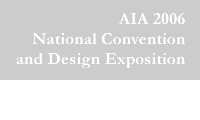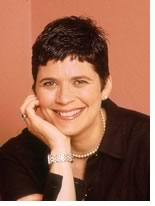

5/2006

Hispanic media pioneer Chiqui Cartagena, a leading U.S. expert on the red-hot Hispanic market, and Paco Underhill, the acknowledged founder of the “science of shopping,” will be revealing their marketing secrets at the upcoming AIA National Convention and Design Exposition in Los Angeles, June 8–10. Both presentations promise to be among the most important practice-oriented seminars on this year’s agenda.
 Latino Boom!
Latino Boom!
Chiqui Cartagena will address the convention on Friday, June 9, 4–5:30
p.m. Her presentation is called “Latino Boom! Everything You
Need to Know to Grow Your Business in the U.S. Hispanic Market.” Cartagena
is managing director of multicultural communications for New York-based
Meredith Integrated Marketing. She has 20 years’ experience developing,
running, and launching some of America’s most successful Spanish-language
consumer magazines, including People en
Español, where she served
as senior editor, and TV Guide en Español, where
she was an executive editor.
Prior to joining Meredith Integrated Marketing, Cartagena was business development director for the Ad Age Group, where she created Hispanic business opportunities for its trade magazines Advertising Age, Creativity, and Madison + Vine, as well as for its Web sites AdAge.com and AdCritic.com. She was also senior director of Club Musica Latina for Columbia House, where she developed marketing programs. Cartagena’s additional experience includes at the Spanish media company Univision, The Miami Herald’s partner newspaper El Nuevo Herald, and New York One News.
A native of Madrid, Cartagena has received many honors for her pioneering work in Hispanic marketing. In her recently published business primer on the Hispanic market, Latino Boom! Everything You Need to Know to Grow Your Business in the US Hispanic market, Cartagena refers to herself as a “Hispanic media war veteran.” She discusses the cultural differences between Hispanic and Latino, and the differences between and among isolated, acculturated, and assimilated Hispanics. A centerpiece of The Latino Boom is about how the Hispanic market is large, somewhat misunderstood, and certainly underserved.
Cartagena will give attendees at the AIA convention a thorough overview of the Hispanic market today and where it is heading tomorrow. “By now everybody knows that Hispanics are the largest and fastest-growing minority group in the country, but did you know that, according to a study by the Los Angeles-based Thomas Rivera Policy Institute, Hispanics are expected to buy between 1.5 million to 2.2 million homes in the next five years?” explains Cartagena. “That’s right, Hispanic home ownership grew by a whopping 80 percent between 1995 and 2005 compared to an 18 percent growth in the non-Hispanic market. Are you ready for this opportunity?
“To help the AIA get ready for this Latino Boom, I will specifically address how Hispanics are influencing home architecture, and the important role Hispanic women play in all the decisions related to the home. And, of course, I will also address the trends of Hispanic-owned businesses.”
Cartagena will also be available to sign copies of her book, Latino Boom!, which will be on sale at the AIA Book Store during convention.
Cartagena consults for many Fortune 500 companies. Among her honors are the 1995 Silver Award from the Chicago International Film Festival for her documentary film, Sis: The Perry Watkins Story; 1998 Woman of the Year award from the Spanish newspaper El Diario/La Prensa; and the 2003 Special Achievement Award from the U.S. Postal Service.
 Why we buy
Why we buy
Paco Underhill is the founder, CEO, and president of Envirosell, a New
York-based behavioral market research and consulting firm with offices
around the world. He has been conducting research on the aspects of
shopping behavior for more than 25 years. Envirosell’s client list
includes McDonald’s, Starbucks, Estee Lauder, Blockbuster, Citibank,
The Gap, Burger King, and Wells Fargo. Underhill will address the convention
on Saturday, June 10, 8:15–9:45 a.m. His presentation is called “Why
We Buy.”
Underhill has developed what some refer to as “retail anthropology.” In his best-selling first book, Why We Buy (2000), he dissected the behavior of everyday consumers. Why We Buy has sold more copies than any other retail book in history. In his second book, Call of the Mall: The Geography of Shopping (2005), Underhill describes a day at the mall, assessing everything from the frenetic parking lot to the calculated juxtaposition of stores and space. “It could be much better,” he writes, “more vivid, intelligent, adventurous, entertaining, imaginative, alive with the human quest for art and beauty and truth. But it’s not. It’s the mall.”
Underhill has cataloged more than 900 aspects of interaction between the shopper and the store. His firm, Envirosell, specializes in examining consumer-shopping behavior using a combination of in-store video recording, observation, and customer-intercept interviews. These vary from how people enter (the “human downshift period”) and walk through the store (most of them turn to the right) to how they react to the size and layout of aisles. According to Underhill, successful stores capitalize on shoppers’ unspoken inclinations and desires. His research shows how the current retail world is ruled by factors such as gender, “trial and touch,” and human anatomy. He looks into the future of retail—projecting the massive retail opportunities with an aging baby-boom population and predicting how online retailing will affect shopping malls.
Underhill explains what he will address in his AIA Convention presentation: “Architectural and store-planning magazines are notorious for being filled with beautiful picture of spaces with no people in them. For the past 20 years, I have been designing tools to evaluate the success of the design process and what happens when we put people into the picture. I am a frame-maker who helps the architect and designer focus their energies. My lecture will focus on a series of themes that come up in every job we do: the biological constants that govern how we move, the evolution of visual language, how real time and perceived time interact, and what makes a female-friendly environment.”
Underhill and his firm’s findings have been profiled in The New Yorker, The Washington Post Magazine, Business Week, and Smithsonian Magazine and have been featured on ABC’s 20/20 and CBS’s 48 Hours. Underhill is also a regular contributor to NPR and BBC Radio, and his columns and editorials have appeared in the New York Times, London Times, Wall Street Journal, and the Christian Science Monitor.
—Russell Boniface
Copyright 2006 The American Institute of Architects.
All rights reserved. Home Page ![]()
![]()
Learn more about and
register for the AIA 2007 National Convention and Design Exposition. ![]()
![]()